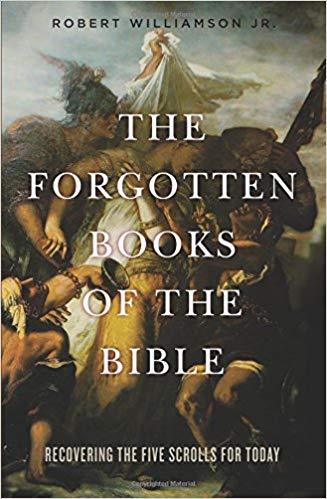A Wider, Funkier Faith
Robert Williamson invites us to a wider, funkier faith
in The Forgotten Books of the Bible
funky faith = a faith in God that includes a wide
range of emotions, such as anger and yearning for intimacy,
sometimes considered inappropriate for pious people.
funky Bible = a vast encyclopedia of texts,
considered sacred by Christians and Jews, filled
with sayings and stories that can help evoke a funky faith.
funky God = a cosmic intelligence, within and beyond
the universe, present in the thick of daily life, who
who lures each and all toward a funky faith.
Excerpt from The Forgotten Books of the Bible |
In The Forgotten Books of the Bible Robert Williamson shows that a wider and more biblical faith can include "nice" emotions such trust and love, but also anger, skepticism, despair, honesty about mortality and a love of life itself, including bodily life and intimacy.
I am reading his book now, and I think of a friend of mine who once said to me, in the midst of a love affair: "I fell out of love with the Bible because it wouldn't allow me to be human." Not so with Williamson's approach to the Bible. We best be careful. For those of us who rarely read the Bible, or who think it is merely the product of an iron-age thinking, a surprise is at hand. With help from Ecclesiastes, Esther, Lamentation, Ruth, the Song of Songs, we just might fall in love with the Bible again....or, as is the case for so many, for the first time. For Williamson the Bible is not a rule book but rather an invitation to listen attentively -- dare I say mindfully in an almost Buddhist sense -- and then to respond freely and imaginatively. Imagine that you've been invited to a party lots of interesting people, most of whom you don't know, and that they all have stories to tell: sometimes happy, sometimes tragic, always intense. You listen to their stories and, as you do, you realize that their stories can help you frame your story, too. You don't have to agree with the biblical authors and voices, but you can hear your own humanity in them, too. In the words of the playwright Terence so long ago: "Homo sum, humani nihil a me alienum puto", or "I am human, and I think nothing human is alien to me." In the hands of Robert Williamson, a pastor himself, the Bible is a deeply human book. Perhaps you are a person of faith, but you've been thinking of faith in narrow terms: all about niceness and hope, but not about, well, despair and skepticism and sex. With help from the biblical voices Williamson brings to your attention, you still get to develop your faith -- it's yours after all. But the voices can inform your own development. Your faith can become more robust, funkier. Maybe ecpecially the otherwise forgotten books. Here's how Williamson puts it: 'the fact that these books are included in the biblical canon should shape our understanding of what faith looks like. That the Bible embraces the skepticism of Ecclesiastes means that faith can embrace our skepticism, too. That Lamentations allows full-throated anger at God’s injustice means that we, too, can be angry at God without losing our place in the faith. We have tended to be narrow in our notions of what being “a good Christian” looks like. The Bible is actually much more expansive than we are.' So who or what is the God in whom a person might place his or her funky faith? Williamson invites us into a conversation on this and other matters.
I hope that you’ll continue the conversation in other ways. I hope you’ll go back and read the biblical texts for yourself to see what I’ve missed. I hope you’ll get together with others to wrestle with what the Bible has to say about sex and sexuality, about immigration, about protest, about death and dying, and about ethnic nationalism. I hope you’ll dig through the rest of the Bible to see what surprising things it might say about other issues that you’re struggling with, about the nature of God, and about what it means to be human. In whatever is your way, I hope you’ll continue to engage. For my part, I have found the perspective of process theology most helpful in thinking about God and, for that matter, in reading the Bible. One of my favorite biblically-rooted process theologians is Rabbi Bradley Artson of the Ziegler School of Rabbinic Studies in Los Angeles. I listen to his "Moments of Torah" every week; you'll find some of them included on a page in this website: "Moments of Torah." His view of God - articulated in God Almighty? No Way! -- is one that I share. And I find the talk below, offered extemporaneously in a talk to seminary students. in understanding a uniquely Jewish approach to scripture: one that avoids literalism on the one hand and modernist dismissal on the other.
So, admittedly, I hope that if, as Robert Williamson recommends, we dig through the Bible as a beloved partner in faith, we also consider the perspective of Rabbi Artson as a partner, too.
But the value of Robert Williamson's approach, it seems to me, is that he avoids doing too much theology. He avoids staking out a position and arguing for it, encouraging us instead to think through our own points of view, our own faith in dialogue with the rich traditions of the Bible and one another. And he encourages us to recognize that faith itself cannot be merely private. It can, it must, include addressing issues such as immigration and economic nationalism, along sexual self-expression and gender-identity, in the wider culture. Only as we address those issues, with the Bible in one hand and our reason and experience and traditions in the other, can our faith rise to the standard of true funkiness, where the incarnate life and the incarnate word come together, in zest and power and love. |
Excerpts from Williamson Interview
Ragan Sutterfield: The Bible can be overwhelming with all of the books available for our study and attention. Why should we spend time with these “forgotten books” (Song of Songs, Ruth, Lamentations, Ecclesiastes, and Esther) when few Christians have really explored the Torah or major prophetic books? |
Ragan Sutterfield: I can understand how Ruth might help us in our faith and of course the Song of Songs has deeply informed the Christian mystical tradition, but included in these five books are some of the most puzzling pieces of scripture. I have a friend, for instance, who is an academic philosopher who half jokes that Ecclesiastes was written by an agnostic or at least that the book supports agnosticism. And then there is Esther, which doesn’t even mention God. How do such books “contribute to the life of faith?” |



